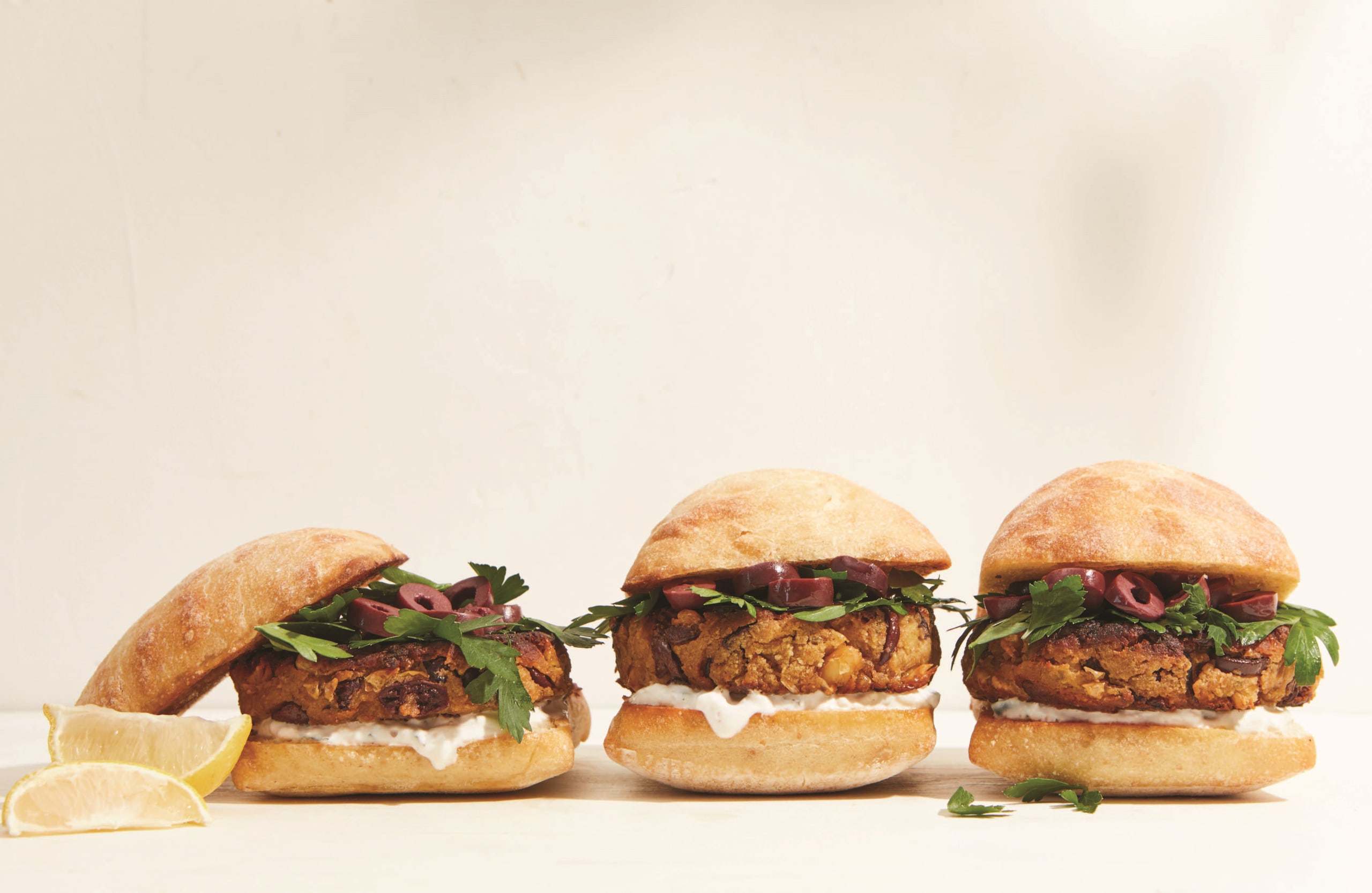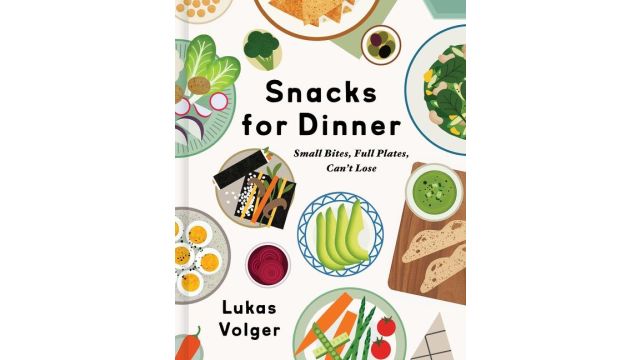Q&A with Lukas Volger

Transforming the burger, that fast-food staple, into a nourishing, vegetarian dish requires skilful innovation and culinary zeal.
That’s why it makes sense to get to know Lukas Volger, who has flipped the notion of the burger to spotlight vegetarian versions to savor with relish. Brooklyn-based Volger has established himself as a worthy figure in the realm of plant-based, weeknight-friendly cuisine.
His cookbooks Snacks for Dinner, Bowl, Vegetarian Entrees That Won’t Leave You Hungry and Start Simple, each showcase ingenuity and expertise. Notably, Volger's debut work, Veggie Burgers: Every Which Way, garnered such popularity that it recently released second edition has been revised and updated.
Volger’s culinary talents have earned him recognition as a cookbook author, recipe developer, culinary content creator, and food stylist. His work has been featured in prominent publications and he has also graced the airwaves of Splendid Table and garnered acclaim as the cofounder and editorial director of Jarry, a queer food journal which received a James Beard Award.
With his innovative approach to vegetarian cuisine, Volger continues to embrace the delicious possibilities of plant-based eating as a gateway to a healthier, sustainable, and flavorful way of eating.
Roundglass Food: What are the key takeaways from your book a home cook can find to incorporate vegetables and plant-based ingredients into veggie burgers?
Lukas Volger: My goal in all of my food work is to make a home-cooked, vegetable-rich dinner seem enticing and feasible, such that it becomes the default — so I try to keep my recipes as simple and straightforward as possible. And I always approach my veggie burgers by thinking of them as a way to highlight a specific vegetable, or a specific pair of complementary vegetables, rather than starting from the point of trying to mimic the flavor and texture of meat. For me, what's exciting about veggie burgers is that they can be new and unique expressions of vegetables.
RG: Why do you say veggie burgers embody the future?
LV: I'm not entirely sure that they do embody the future, but a few years ago, that's what the promise of food tech and their lab-made meat seemed to be. I don't disparage these products, I think they have a place in our food system, and I think it's necessary that we think of scale, as those businesses do, when we try to come up with solutions to the problems of meat consumption. But for me, from a deliciousness perspective, I'm most excited about real vegetables as my ingredients, in their most nutritious and most whole-food states, and I would love for the future to be more of that.
RG: Why do you call the veggie burger a peace offering?
LV: I think they had that reputation back when the first edition of the book came out. They were a concession at a grill-out, a peace offering to the non-meat-eaters to have so that they could feel welcome. This is more true for the frozen than homemade ones.
RG: What are your learnings from running a food business based on sustainability and health?
LV: There were so many learnings. I went into my Made by Lukas business from a love of food and a passion for fresh vegetables, but it would have been much more successful if my passion had been business. (Tale as old as time!)
My chief learning was that fresh, healthy, locally made food is hard to scale. Fresh vegetable-based foods unfortunately don't have super long shelf lives, and products like mine, that were unfamiliar to shoppers at the time, need a lot of up-front investment in the form of passing out samples and educating consumers, in order to generate proper velocity in a grocery store. It was absolutely heartbreaking to see my expired burgers on shelves.
RG: In food terms what does a burger mean for an average American? How would you like it to change and why?
LV: I think in food terms, the average American regards a burger as reliable and enticing nourishment. I think this is why veggie burgers continue to endure — there's just something about a patty, whatever it's made out of, when sandwiched between a bun. And given that American cuisine is so hard to pin down, I actually like that the burger is such a uniquely American phenomena. The only thing I'd like to change is for people to swap in veggie patties more often for the meat ones.
RG: Can you provide tips on creating veggie burgers that are low in saturated fats and cholesterol, while still being flavorful and satisfying?
LV: My recipes are low in saturated fats and cholesterol — the primary bases are beans, tofu, or vegetables, and in most recipes there's a modest amount of olive oil used as the cooking fat. In my burgers, the best way to control those concerns is with condiments.
RG: What’s your go-to veggie burger after a hard day’s work?
LV: I really love my beet and hazelnut burgers, which were one of the ones I sold through my Made by Lukas business. That's my favorite flavor profile — beet and hazelnuts. I usually put them on top of salads, rather than in a bun, ideally with thinly shaved fennel.

Tuscan white bean burgers (Pic Courtesy: Veggie Burgers: Every Which Way)
RG: What’s the one nutritional discovery that blew your mind while researching for vegetable burgers?
LV: I didn't think about nutrition that much when I was developing my recipes. I have my own gauge for what feels healthful and sensible, as everyone does, but my feeling is that if you're regularly eating a variety of vegetables and other plant-based whole foods, you're automatically on the right track to maintaining a nutritious diet.
RG: If you could invite anyone over for dinner, who would you call and what would you serve them?
LV: I would cook for my mom, who passed away almost 20 years ago, before I published my first cookbook. She may have suspected I'd have a career in food, but probably never would have predicted that I'd be so fortunate as to do this, and she'd have cherished the opportunity to be part of it by cooking and brainstorming with me. And I'd particularly love to cook with her, since those are some of my most treasured memories growing up.
RG: What’s a food experience that transformed your life?
LV: My first food job was during a high school summer at a bakery in Boise, Idaho, where I grew up. One day, the owner arrived very stressed out that there'd been a mix-up with our biscotti orders (we supplied biscotti for one of the bigger coffee chains) and that she hadn't factored nearly enough of it into the schedule to meet the next day's orders. She didn't know what to do, because there wasn't really anyone on staff who was available to do it, nor was there room in the schedule for the day to squeeze it in.
I wasn't officially a baker there — I was hired to work the register and then help with some of the kitchen tasks during downtime — but I knew how to make the biscotti. So, I immediately offered to stay that night to do it, so that it'd be ready for the morning deliveries. And it was amazing. I was alone in the kitchen, singing along to my own choice of radio station and enjoying full roam of the kitchen, hands elbow-deep in biscotti dough until about 3:30am, when the official baker showed up to start his shift. In doing that, something clicked for me — it seemed crazy to everyone else that I'd take the work on, but it really was a thrill.
----------------
Key Takeaways
- Volger picks whole foods for veggie burgers.
- Home cooked burgers are healthier.
- Veggie burgers pack in nutrition.


